I spotted this odd gashapon (Japanese gumball machine) toy featuring a cicada exuvia with a sniper molting from it on Aliexpress.
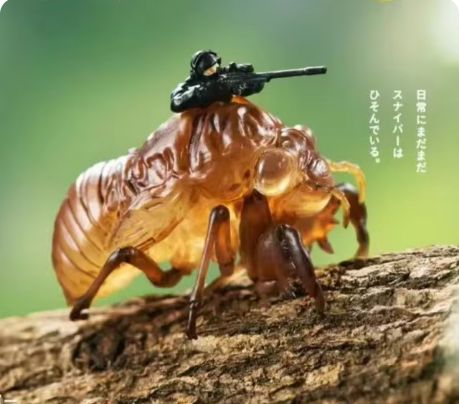
I spotted this odd gashapon (Japanese gumball machine) toy featuring a cicada exuvia with a sniper molting from it on Aliexpress.

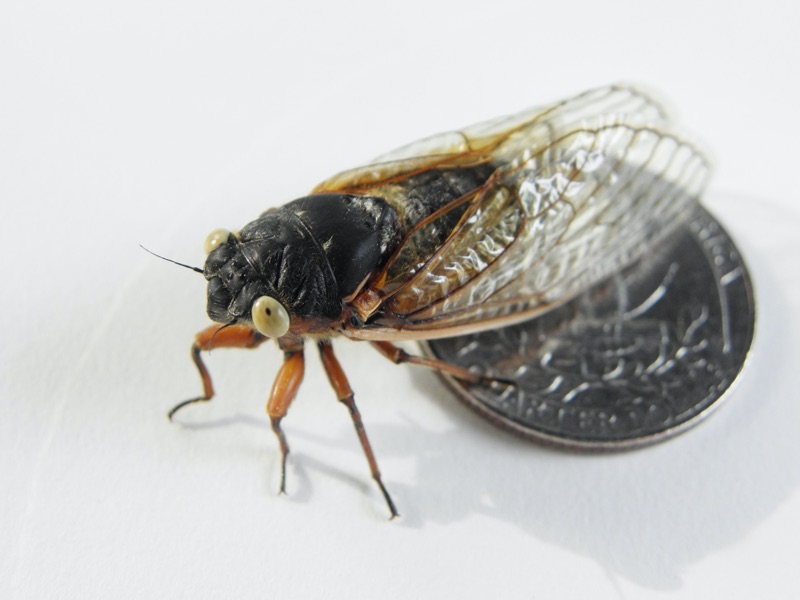
How rare are Magicicadas cicadas with white or blue eyes?
Do we include yellowish-white/cream-colored eyes? Gray eyes?
“One in a million!”
“One in 100,000?”
“One in 1000”?
Let’s look at some data. Since its beginning, as of June 19th, 2024, iNaturalist has had 27,294 Research Grade Magicicada sightings, and 136 Research Grade “Magicicada eye color=blue/white” cicadas. So, in the iNaturalist data set, one in 201 Magicicada have white or blue eyes.
The number of white/blue eyed Magicicada is without a doubt more than one in 201, but not one in a million. Personally, I’ve found at least one cicada with white or blue eyes per emergence. My guess is the number is closer to one in 10,000.
But don’t tell anyone who is excited about a one in a million find. Let them have their fun and happiness. 🙂
More articles about eye color.
Today I was digging in a flower garden that is mostly inhabited by thick-stemmed Montauk Daisies, and I found many cicada nymphs. The nearest tree is about 25 feet away — I guess any type of root will suffice for some cicadas.
They seem weak and disorientated, which makes sense since they’ve lived underground their whole lives.
There are Magicicada (Brood II), Neotibicen tibicen, Neotibicen lyricen, and Neotibicen linnei in the yard. I haven’t investigated which species these are yet, but I think it’s likely they’re not Magicicada because they were relatively large (bigger than a penny) and Brood II is 6 years away.
How can you tell if a Magicicada periodical cicada nymph is ready to molt?
Answer: look for two black spots on its back (technically the cephalothorax). They look like they are wearing aviator sunglasses pushed up on their forehead!
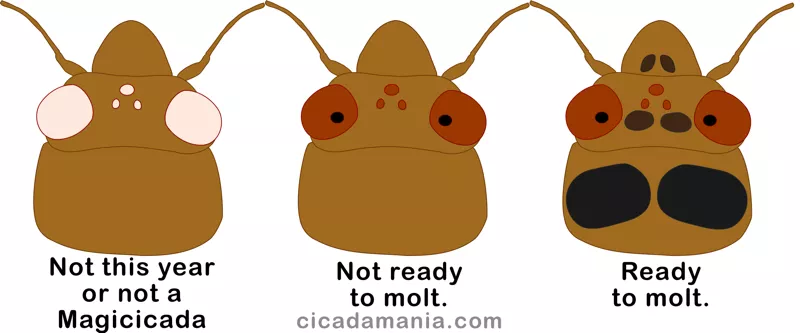
I do not know the official name for these spots, but they seem to be related to the pigment that turns the cicadas black after they molt. They may scare away predators that think the spots are big eyes!
Here are a few ideas for a name for them:
obscuras maculas
mutatione macularum
Neotibicen cicadas come in a variety of pastel colors when they are in their teneral (soft) phase, when they inflate their wings and harden their bodies after molting their nymphal skins. Teneral Neotibicen can feature the colors pink, yellow and blue, in addition to pastel versions of the oranges, browns and greens we commonly see on their fully-hardened adult bodies.
Here’s an example of a male Neotibicen lyricen that was pink when it was teneral:
Here’s photos of the same cicada as a nymph and a hardened adult. See that its mesonotum are black and brown, not green and brown. It’s closer to a Neotibicen lyricen engelhardti than the Neotibicen lyricen lyricen, which has green on its mesonotum (the cicada’s shield-like back).
I had virtually no time in the summer of 2023 to look for cicadas outside my town. Also in 2023, the name of Megatibicen auletes (Germar, 1834) aka Northern Dusk Singing Cicada changed to Megatibicen grossus. While I was not lucky enough to see a Megatibicen grossus, I did find exuvia (molted skins), a headless corpse and some exit holes in late August in the Brendan Byrne park in New Jersey. Something is better than nothing.
A male exuvia and a headless female Megatibicen grossus
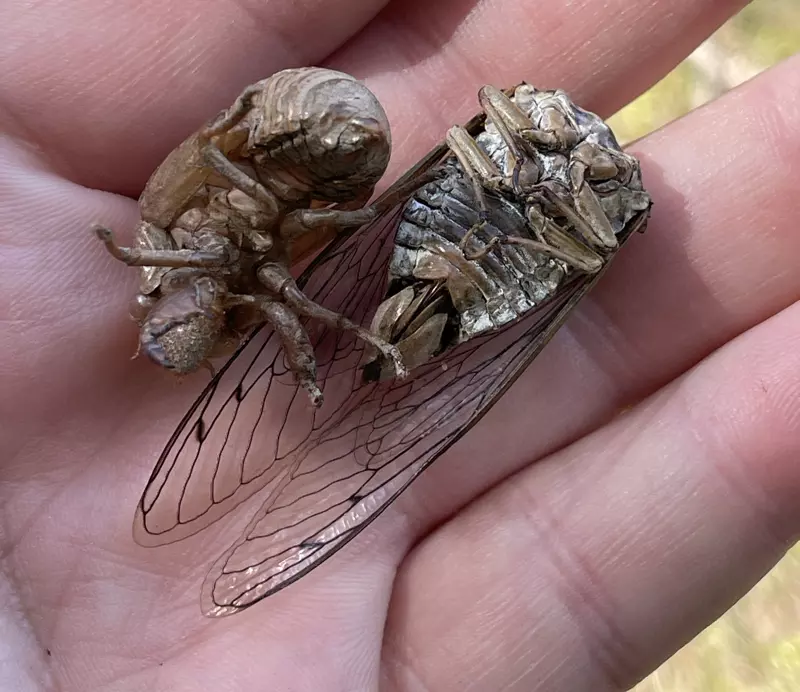
A headless female Megatibicen grossus
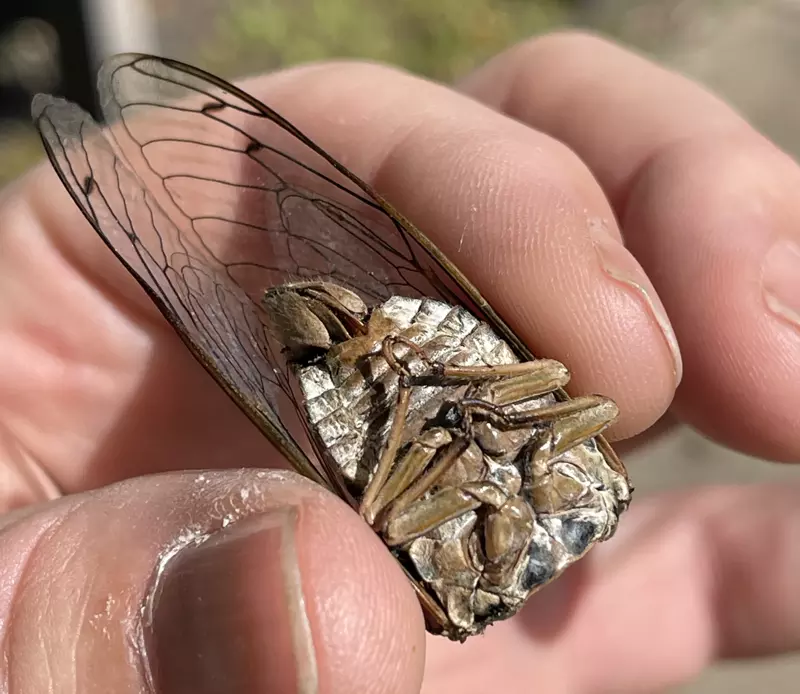
A Megatibicen grossus exuvia with ruler.
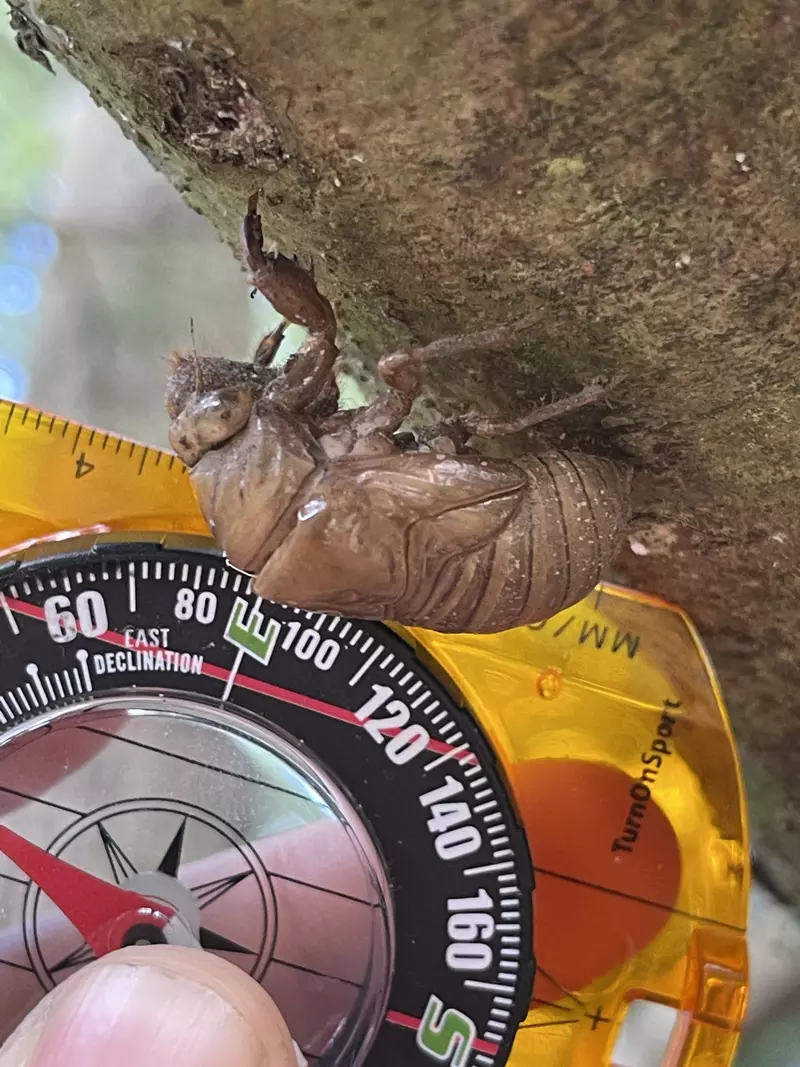
Three exuvia top to bottom: Megatibicen auletes, Neotibicen sp., Neocicada hieroglyphica
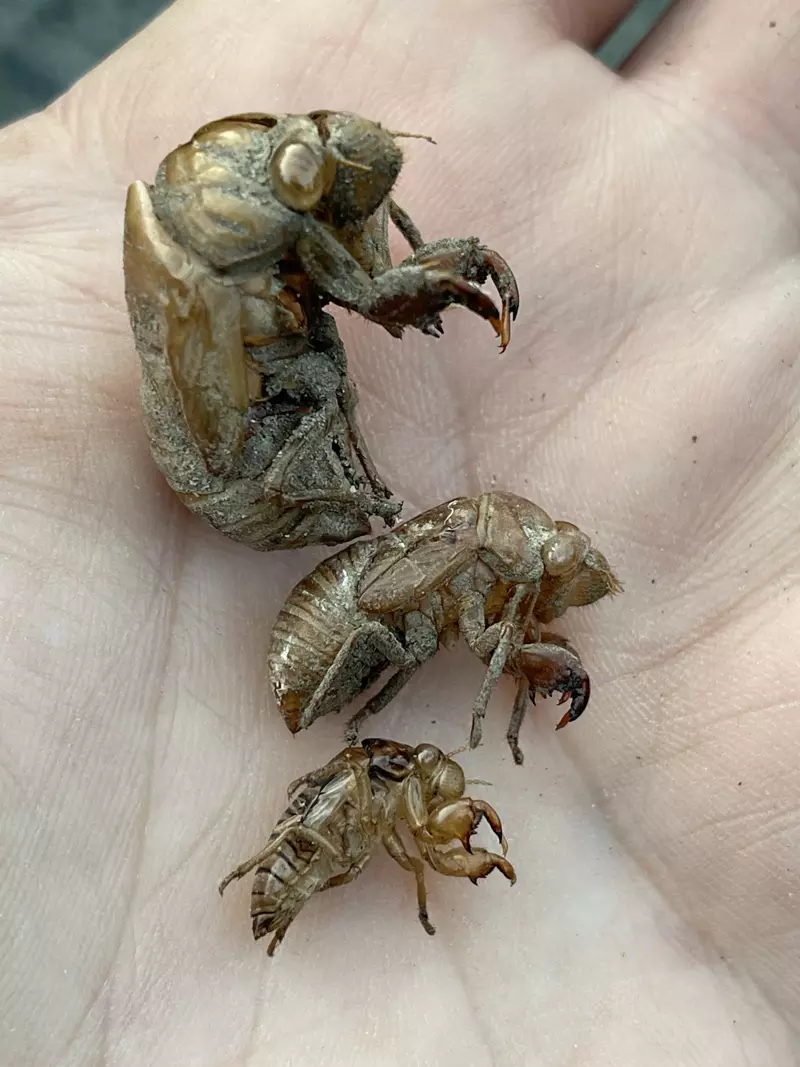
This is a gallery of Magicicadas taken at West Virginia University’s Core Arboretum from the 2013 Brood V emergence.
Click/tap the images for larger versions.
Visit Gallery #1 from more photos From the Core Arboretum, Morgantown, and Brood V.
Magicicada cassini on tree plague:
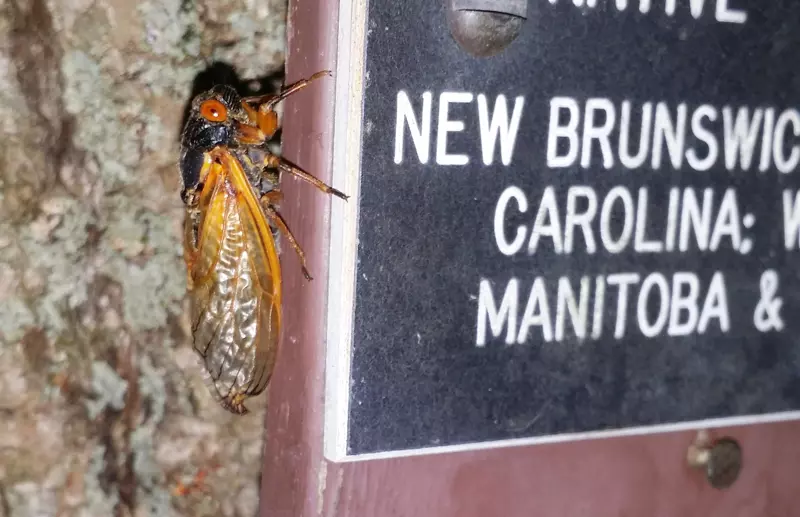
Magicicada septendecim abdomen:
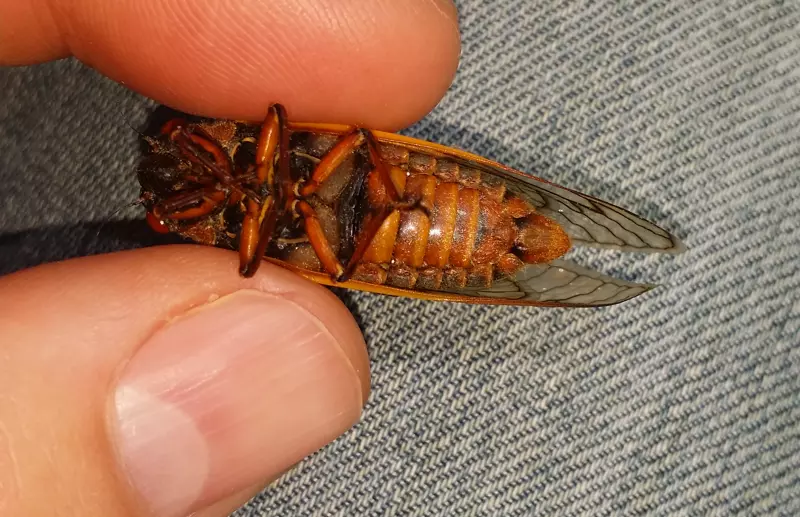
Magicicada with damaged wings and beige eyes:
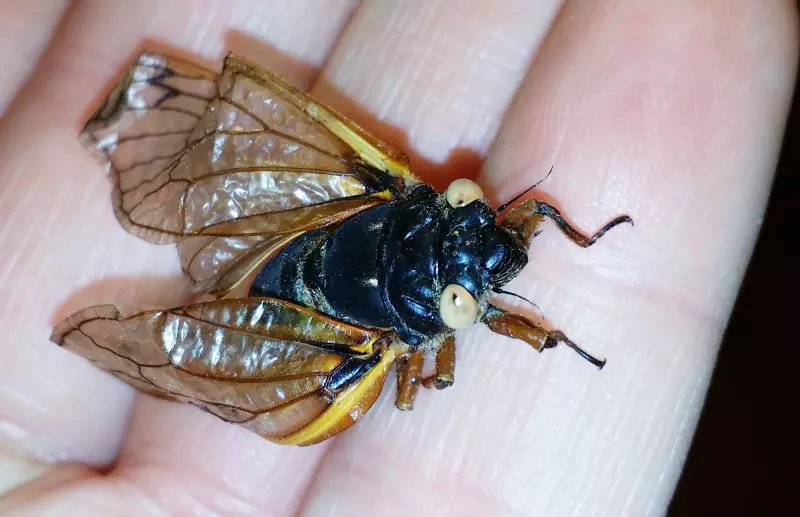
Magicicada with slightly orange markings on abdomen could be ‘decula or cassini:
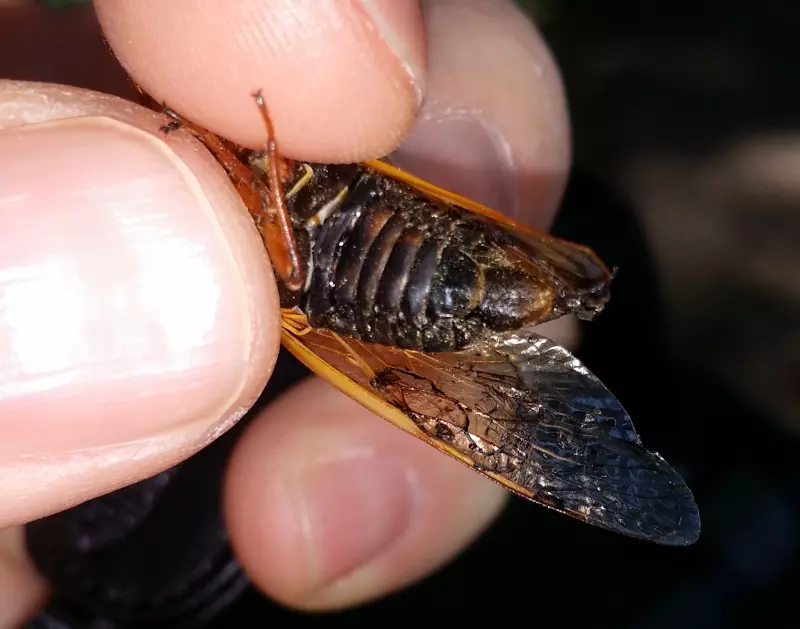
Male Magicicada septendecim abdomen:
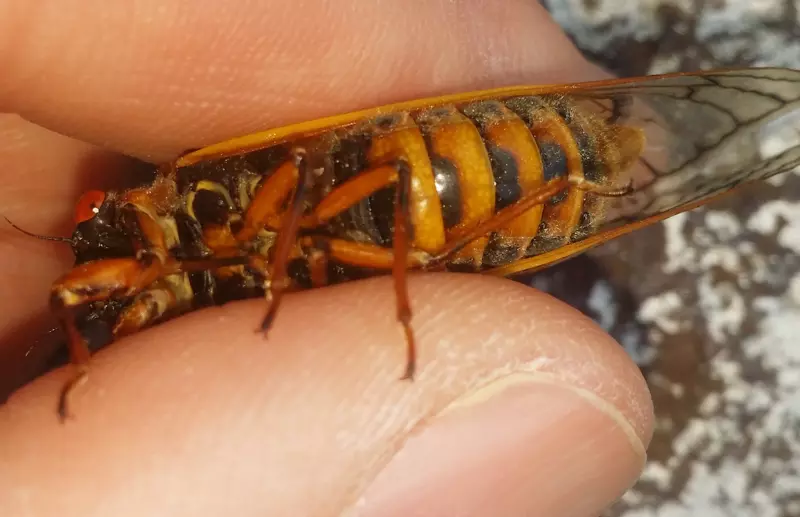
Many Magicicada exuvia and corpses:

Visit Gallery #1 from more photos From the Core Arboretum, Morgantown, and Brood V.
The last Neotibicen tibicen tibicen I found in 2023, on August 13th.
SoNtt Calendar: July 16th, July 22nd, July 23rd part 1, July 23rd part 2, July 24th, July 26th, July 27th, July 28th, July 29th, July 30th part 1, July 30th part 2, August 1st, August 4th, August 9th, August 11th, August 13th.
My family and I captured and molted over 50 Neotibicen cicadas in 2023. We molt them in butterfly pavilions and then release them the next day. Most are Neotibicen tibicen tibicen (Morning cicadas).
Here’s the collection of exuvia (skins) as of August 4th.
SoNtt Calendar: July 16th, July 22nd, July 23rd part 1, July 23rd part 2, July 24th, July 26th, July 27th, July 28th, July 29th, July 30th part 1, July 30th part 2, August 1st, August 4th, August 9th, August 11th, August 13th.
This is the August 1st edition of the Summer of Neotibicen tibicen tibicen.
This cicada has molted and its wings have filled with fluid and are in place, ready to harden. It is a male.

SoNtt Calendar: July 16th, July 22nd, July 23rd part 1, July 23rd part 2, July 24th, July 26th, July 27th, July 28th, July 29th, July 30th part 1, July 30th part 2, August 1st, August 4th, August 9th, August 11th, August 13th.